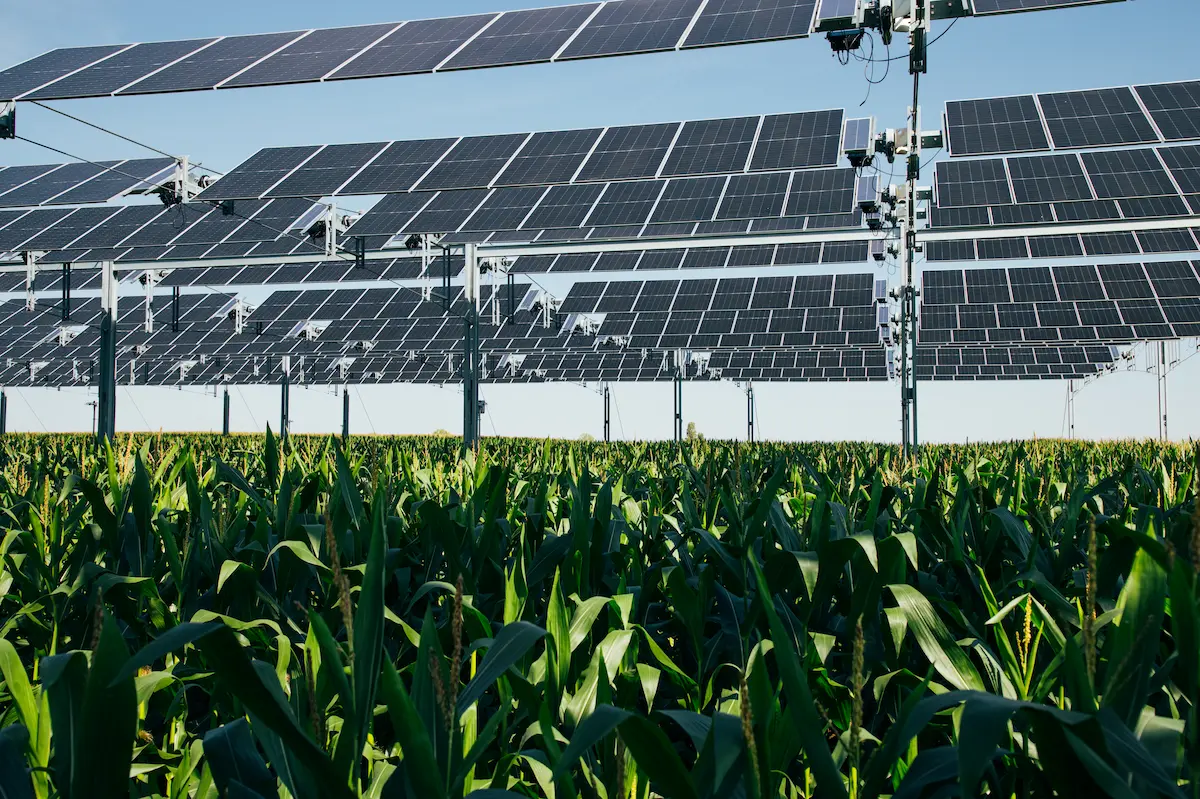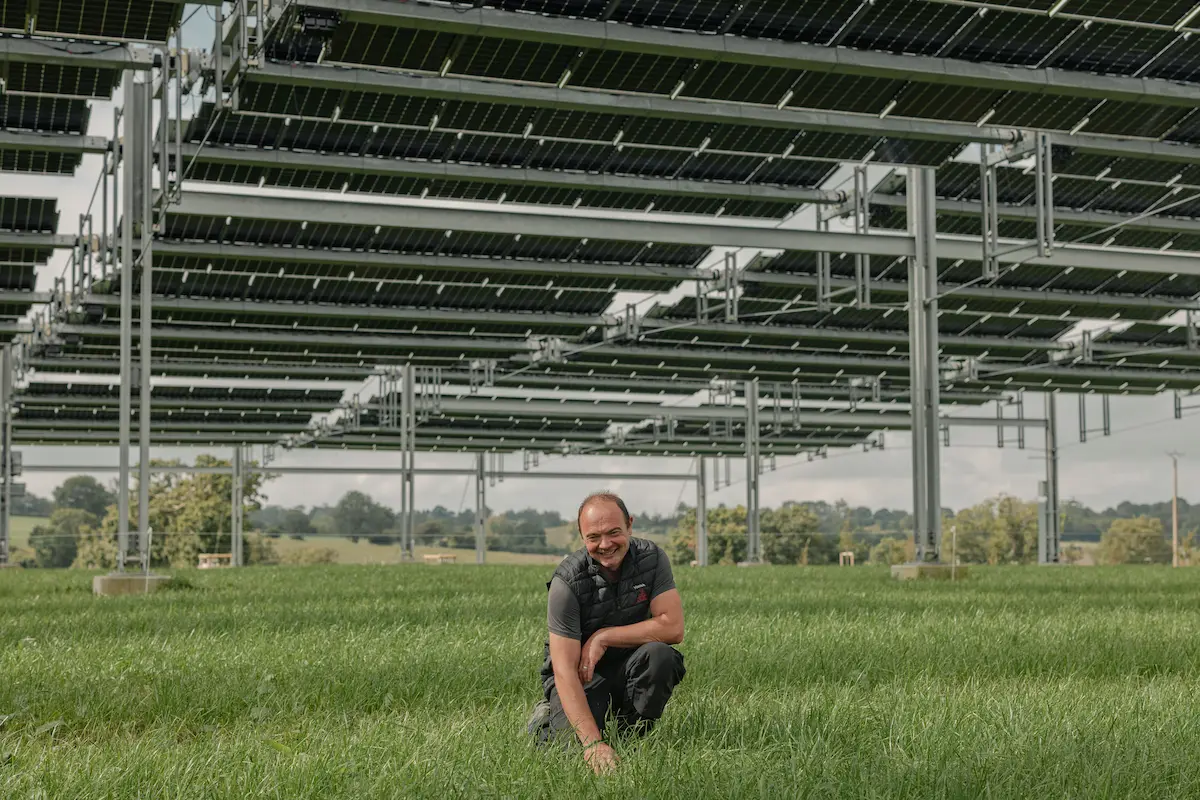“We are going to accelerate agrivoltaics” -Agnès Pannier Runacher

This Thursday, March 21, the actors and stakeholders of the agrivoltaic canopy project, which will be inaugurated this spring 2024 in Verdonnet (Côte-d'Or) on the farm of Mr. Cortot and Mr. Lallemand, welcomed Agnès Pannier-Runacher, Minister Delegate to the Minister of Agriculture and Food Sovereignty, in order to present to her the challenges of this project, which is as innovative as it is called upon to develop in Bourgogne-Franche-Runacher, Minister Delegate to the Minister of Agriculture and Food Sovereignty, in order to present to her the challenges of this project, which is as innovative as it is called upon to develop in Bourgogne-Franche-Runacher County.
A round table, in the presence of agricultural managers, farmers, scientists and local elected officials, also made it possible to discuss the challenges of diversifying agricultural productions and sharing value, in the service of strong, autonomous and innovative agriculture in the territories. In Verdonnet, the synergies between food production and the production of green energy are at the heart of the dynamics of the project.
An impacting and exemplary regional project, combining agricultural, electrical and sustainable agriculture production
At the origin of the project, Jean-François Cortot, seeks to innovate and adapt his profession to new environmental and climatic constraints. The operator's crops have particularly suffered from heat and water stress in recent years. Strong temperature variations and especially long periods without water have had a significant impact on yields and plant growth, especially in wheat cultivation, thus bringing the harvest date forward.
Designed by TSE, as part of a co-development partnership established two years ago with the cooperative union Alliance BFC (Dijon Céréales, Bourgogne du Sud and Terre Comtoise), the agrivoltaic canopy set up on this site is a self-supporting system of photovoltaic panels that, while producing electricity, protects crops from heat and water stress, such as destructive climatic episodes.
The initial results are very encouraging, with, for the Rubisco maize variety, an increase of +14%!
The Verdonnet installation will be constantly monitored in terms of the performance of the canopy, but also of the crops grown under the panels. This rigorous agronomic evaluation will be carried out over nine years by the Alliance BFC R&D teams in collaboration with Inrae BFC. This monitoring will make it possible to identify robust technical references and thus feed into the work of the National Research and Innovation Programme (PNRI) on agrivoltaics.
The Verdonnet agrivoltaic canopy is part of TSE's agrivoltaic demonstrator program, the first in organic farming. This demonstrator will also be deployed in other farms in Bourgogne-Franche-Comté.
A win-win partnership at the service of the agricultural world
This project, selected by the Minister for a dedicated visit, is a typical example of co-construction carried out thanks to a win-win partnership between actors in new energies and agricultural actors, from producers to the regional cooperative component.
This meeting of all actors with Minister Agnès Pannier-Runacher illustrates the realization of the ambitions of the law of 10 March 2023 to bring about virtuous agrivoltaics and respond to the double challenge of the production of carbon-free energy and the adaptation of agricultural systems to climate change. This law created solid bases for the development of the French agrivoltaics sector, encouraging its development while setting a high level of requirement on the quality of projects and the service provided to agriculture.
Alliance BFC and TSE are fully in line with this dynamic.
Their views on the project
Agnès Pannier-Runacher, Minister Delegate to the Minister of Agriculture and Food Sovereignty:
“We are going to accelerate agrivoltaics. I am announcing that the decree, which was presented to the Council of State at the end of December, will be examined on 26 March. It will be published in the days that follow and it will allow us to work department by department, to do “hand-stitching” on the territory, because the challenges are not the same everywhere. It is therefore necessary to pilot this deployment, measure the effects through experimental strategies and by building scientific data on the feedback from the various technologies. Your project in Verdonnet illustrates the approach we want to massify, by allowing a group of farmers to have, in a value-sharing strategy that benefits farm income, the possibility of producing low-carbon electricity while improving food production. It is not an individual project but a collective project that can contribute to an agricultural strategy at the scale of a territory. That's what I want to wear.”
Didier LENOIR, president of Alliance BFC and Dijon Céréales :
“We are delighted that this project is now highlighted by a ministerial visit because beyond the symbol, it reflects the dynamic of foresight and innovation in which Alliance BFC is collectively part of with partners such as TSE. Verdonnet perfectly embodies the example of a sustainable, but also duplicable installation, whose concrete effects on the agricultural economy as well as on the economy of a territory will I am sure be able to measure. The definition of tomorrow's agriculture must start from the field and from the regions: one that respects farmers and productions, that contributes to decarbonization, to food and energy sovereignty, that knows how to dare and stay ahead of the curve. This is the case here, in Bourgogne-Franche-Comté.”
Mathieu DEBONNET, founder and president of TSE:
“The Verdonnet agrivoltaic canopy project is a new step forward in the realization of the challenges of food sovereignty and value sharing at the local level, well understood and highlighted by the visit of the minister, Agnès Pannier-Runacher. It is directly in line with TSE's collective commitment to participate in energy, agricultural and climate transitions. Our agrivoltaic solutions like this canopy allow farmers, and more generally the rural world, to benefit from a positive economic and financial impact, while contributing to the production of local and carbon-free energy, the cheapest electricity. Farmers are already producing sustainable energy for everyone today, which is an important paradigm shift, which is taking place without significant changes in their work or loss of production. Thus, with our partner, we allow a territory to maintain control of its destiny. We must really salute the ability of the BFC Alliance to anticipate and design the future of agriculture and agri-food on its regional territory.”
Jean-François CORTOT (SCEA des Tours):
“This canopy is perfectly in line with the philosophy of our farm, that is to say the construction of a sustainable agricultural system, which meets the challenges of diversifying production and economic performance of the farm while respecting the environment. This is an opportunity to develop a new energy production activity, in connection with the installation of the new generation of our children on the farm.”
The Verdonnet facility in key figures
- Installed canopy capacity: 2.95 MWc
- Its annual production corresponds to the equivalent of the residential electricity consumption of 1450 inhabitants.
- The canopy deploys nearly 2,000 two-sided photovoltaic panels, 5 meters high, on a plot of 3 hectares of organic field crops (wheat in 2024),
- A control zone (same surface, same cultivation line) is installed near the demonstrator in order to measure the effects of the canopy on the crops covered,
The SCEA des Tours
4 associated farmers (Messrs. Cortot Jean-François and Adrien and Adrien and Lallemant Hervé and Pierre), on a diversified polyculture farm (diversified organic farming): large cereal crops and legumes, workshop for laying hens and legumes, workshop for laying hens, sheep farming

.webp)



































.webp)








